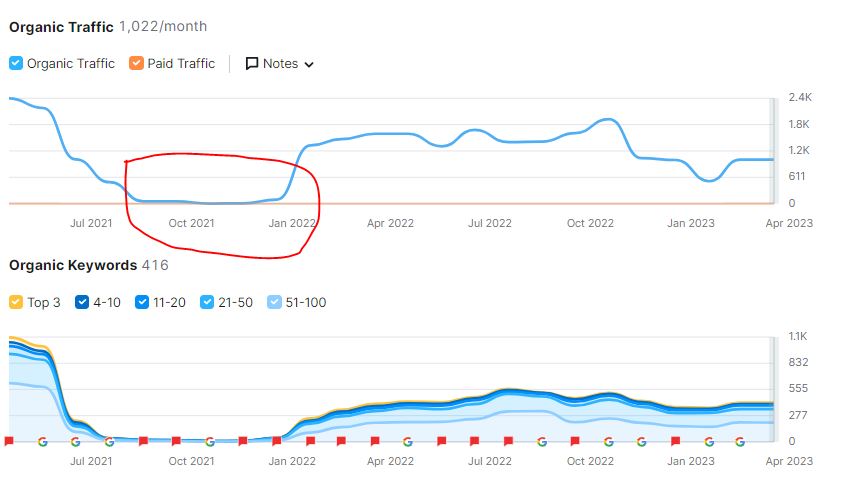
The non-life insurance industry in Bangladesh is highly competitive, and maintaining a strong online presence is crucial for companies to stay ahead. This case study outlines the challenges faced by a leading non-life insurance company in Bangladesh and the strategies implemented to improve its website’s ranking and overall visibility.
Background
The company had an impressive three-decade journey, establishing itself as a prominent player in the industry. However, their website faced severe setbacks when it was hacked, leading to the injection of malware. Consequently, numerous adult and gambling pages were indexed, resulting in penalties from search engines. Furthermore, the company lacked blogs and had accumulated a significant number of spammy backlinks. To compound matters, their competitors were dominating the insurance industry in the region.
Objectives
- Recover from the hacking incident and remove spammy pages and backlinks.
- Improve the website’s ranking and visibility through effective search engine optimization (SEO) techniques.
- Enhance the user experience and on-site optimization of the website.
- Increase organic traffic and keyword rankings.
- Reduce the bounce rate and attract high-quality traffic from organic searches.


Strategies Implemented
SEO Audit and Competitor Analysis
A comprehensive SEO audit was conducted to identify gaps and devise a plan to achieve SEO value. Additionally, a competitor analysis was carried out to gain insights into their strategies and identify areas of improvement.
Keyword Research and Optimization
Targeted keywords were identified, and a keyword research report was prepared for service pages and future blog content. These keywords were strategically implemented in the content body, page titles, meta descriptions, image alt tags, and canonical tags to optimize each page.
Hacking Recovery and Backlink Disavowal
Efforts were made to recover from the hacking incident by removing all spammy pages and disavowing the associated spammy backlinks using the Google Search Console. This action aimed to regain the trust of search engines and improve the website’s reputation.
On-Site Optimization
All on-site issues were addressed, including optimizing the robots.txt file, creating a sitemap, and ensuring responsive design for a seamless user experience across different devices. Content quality was improved by incorporating subject-matter expertise and insights, and FAQ schema with respective PAA (People Also Ask) on-page content was implemented.
Integration with Google Search Console
The website was integrated with the Google Search Console to gain valuable insights and submit sitemaps. Thin content was identified and removed from the search console, resulting in significant improvements in search engine rankings.
Off-Page Optimization
In the third month, off-page optimization efforts commenced. Guest posts were obtained from high-traffic niche-relevant sites to generate valuable backlinks. Additionally, basic backlinks such as profile backlinks and directory submissions were created to further enhance the website’s online visibility.
Results
Penalty Recovery and Organic Traffic
The penalties imposed due to the hacking incident were successfully recovered, leading to a significant increase in organic traffic. The website achieved over 10,000 organic visitors.
Keyword Rankings
All targeted keywords reached the top #5 positions on search engine result pages (SERPs), further solidifying the company’s online presence. Over 300 keywords appeared on the first page of search results, with 200 service-oriented keywords securing the top #1 position.
Bounce Rate Reduction
Through strategic optimization and improved user experience, the website’s bounce rate decreased by an impressive 84%, from 64% to a more favorable level.
Improved Traffic Quality and Quantity
The company witnessed an increase in both the quality and quantity of traffic generated from organic searches. This indicated that the implemented strategies were successful in attracting the target audience.
Natural Backlink Generation
The content created, including blogs and internal pages, naturally attracted numerous backlinks. This organic backlink generation further strengthened the website’s authority and visibility.
Conclusion
Through our diligent SEO efforts, on-site optimization, hacking recovery, and strategic off-page activities, the insurance company significantly improved its website’s ranking and visibility. The implemented strategies not only helped recover from penalties but also achieved top rankings for targeted keywords, increased organic traffic, and enhanced the quality of traffic coming from search engines. By adopting a comprehensive approach and continually monitoring and adapting to the evolving digital landscape, the company successfully transformed its online presence and strengthened its position in the competitive non-life insurance industry.
